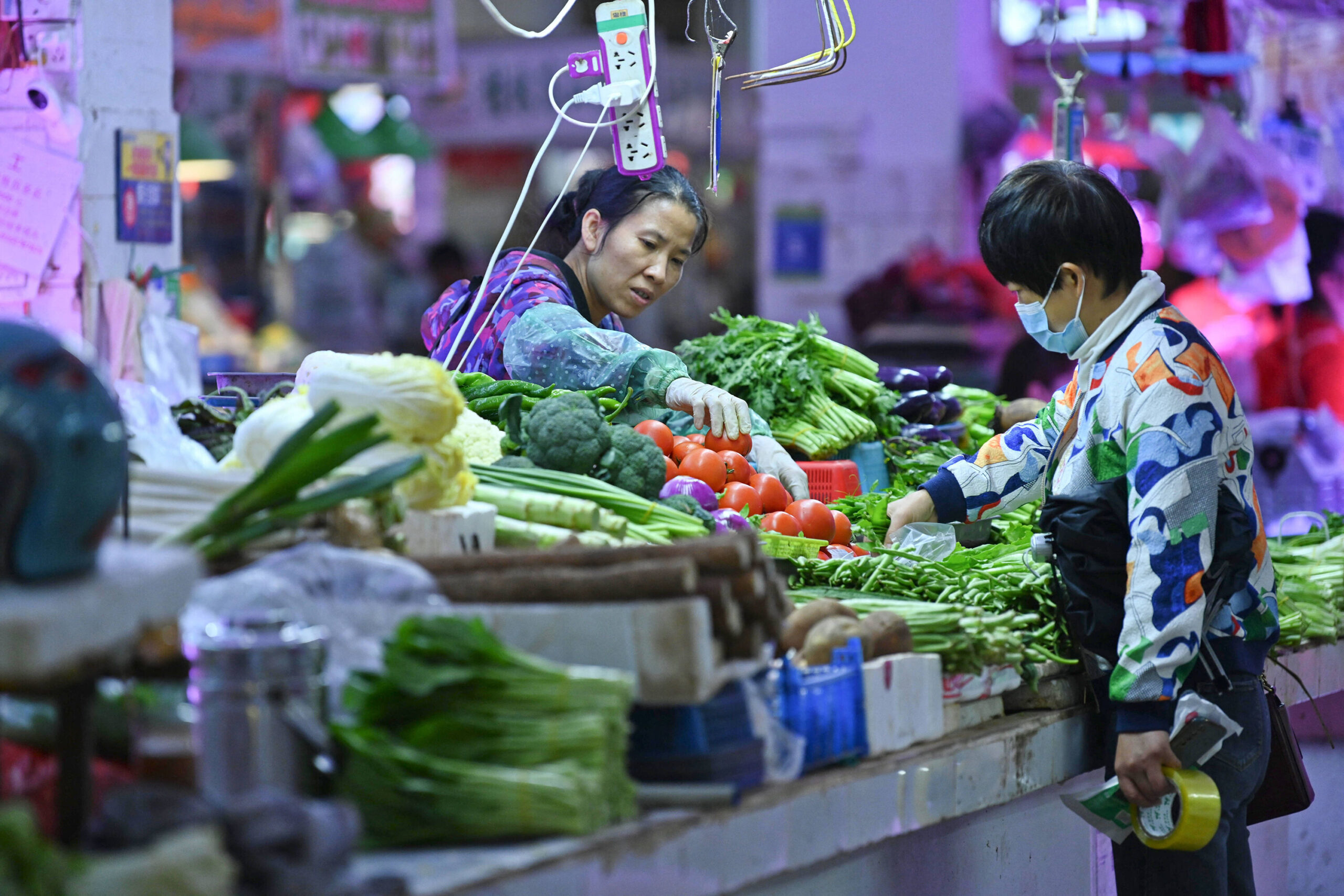China urges families to keep stocks of daily necessities .. what’s going on?
الصين تدعو العائلات إلى تخزين المواد الغذائية الأساسية .. ما الذي يحدث؟
Reuters
SHANGHAI: The Chinese government has told families to keep daily necessities in stock in case of emergencies, after COVID-19 outbreaks and unusually heavy rains that caused a surge in vegetable prices raised concerns about supply shortages.
The commerce ministry directive late on Monday stirred some concern on domestic social media that it may have been triggered by heightened tensions with Taiwan, while some said people were rushing to stock up on rice, cooking oil and salt.
“As soon as this news came out, all the old people near me went crazy panic buying in the supermarket,” wrote one user on China’s Twitter-like Weibo.
Local media has also recently published lists of recommended goods to store at home including biscuits and instant noodles, vitamins, radios and flashlights.
The public response forced state media on Tuesday to try to soothe fears and clarify the ministry’s statement.
The Economic Daily, a Communist Party-backed newspaper, told netizens not to have “too much of an overactive imagination” and that the directive’s purpose was to make sure citizens were not caught off guard if there was a lockdown in their area.
The People’s Daily said the ministry issues such notices every year, but had issued its instruction earlier this year because of natural disasters, the surge in vegetable prices and recent COVID-19 cases.
The ministry’s statement late on Monday urged local authorities to do a good job in ensuring supply and stable prices, and to give early warnings of any supply problems.
EXTREME WEATHER
The government typically makes extra efforts to boost fresh vegetable and pork supplies before China’s most important holiday, Lunar New Year, which in 2022 falls in early February.
But this year those efforts have become more urgent after extreme weather in early October destroyed crops in Shandong – the country’s biggest vegetable growing region – and as outbreaks of COVID-19 cases stretching from the northwest to the northeast of the country threaten to disrupt food supplies.
Last week, prices of cucumbers, spinach and broccoli had more than doubled from early October. Spinach was more expensive than some cuts of pork at 16.67 yuan ($2.60) per kg, a vegetable price index in Shouguang, a trading hub in Shandong, indicated.
Although prices have eased in recent days, economists expect a significant year-on-year increase in consumer price inflation for October, the first in five months.
The pandemic has brought an increased focus on food security, with the government drafting a food security law and outlining new efforts to curb food waste.
The commerce ministry said local authorities should buy vegetables that can be stored well in advance and also strengthen emergency delivery networks. Information about prices and supply and demand of commodities should be released in a timely manner to stabilise people’s expectations, it added.
China also plans to release vegetable reserves “at an appropriate time” to counter rising prices, according to a state TV report late on Monday. It is not clear which vegetables China holds in reserves and how big those reserves are.
The state planning body has called for the timely replanting of vegetables, urging local governments to support fast-growing produce, according to the report.
China has about 100 million mu (6.7 million hectares) planted with vegetables, the agriculture ministry has said.
رويترز
شنغهاي: أوعزت وزارة التجارة الصينية لمواطنيها بتخزين احتياجاتهم الأساسية من المواد الغذائية استعدادا لأي طوارئ محتملة، في وقت يحاول فيه البلد محاربة التفشي المحدود لوباء كورونا الذي يعطل المواصلات.
ونشرت وزارة التجارة -مساء الاثنين- إعلانا على موقعها الإلكتروني، دعت فيه العائلات إلى تخزين كمية معينة من المنتجات الأساسية لتلبية الاحتياجات اليومية وحالات الطوارئ.
كما دعت الوزارة مختلف السلطات المحلية إلى تسهيل الإنتاج الزراعي وتدفق الإنتاج الزراعي والإمداد ومراقبة مخزون اللحوم والخضروات والحفاظ على استقرار الأسعار.
إخطارات منتظمة
ولم تحدد الوزارة -في بيانها الذي نشرته مساء الاثنين- ماهية تلك الطوارئ، لكن تناقلت وسائل إعلام أن هذا الإعلان جاء مع محاولة الصين محاربة التفشي المحدود للوباء الذي يعطّل المواصلات، بينما ربطها آخرون بالتوتر مع تايوان.
وقالت صحيفة غلوبال تايمز -المقربة من الحزب الحاكم- إن مسؤولين من وزارة التجارة الصينية قدموا اليوم توضيحا، بعد الدعوة الرسمية من الوزارة إلى شعبها لتخزين الاحتياجات اليومية والمؤن الغذائية المنزلية.
ونقلت الصحيفة عن المسؤولين قولهم إن الدعوة كانت جزءا من الجهود الحكومية المنتظمة لمساعدة السكان على الاستعداد لحالات الطوارئ المحتملة.
وردا على التكهنات، قال تشو شياو ليانغ رئيس إدارة عمليات السوق وتعزيز الاستهلاك في وزارة التجارة والصناعة والزراعة الصينية إن “الإشعار يهدف إلى ضمان استقرار الإمدادات وأسعار المواد الغذائية للسكان من خلال اتخاذ تدابير مختلفة، بما في ذلك توجيه الشركات لتوقيع عقود التوريد”.
بدوره، قال غوان ليكسين نائب رئيس معهد التداول والاستهلاك التابع لوزارة التجارة إن ضمان إمدادات السوق يعتبر من الضروريات اليومية، وعمليات السوق السلسة إحدى المسؤوليات الرئيسية للوزارة، وتصدر الوزارة مثل هذه الإخطارات المنتظمة لضمان الإمدادات واستقرار الأسعار كل عام.
وأضاف أنه تم إصدار هذا الإشعار بناءً على الكوارث الطبيعية المتكررة خلال الخريف والشتاء المقبل، وارتفاع أسعار الخضار، وحالات الإصابة بفيروس كورونا، وقد تم الترتيب له مسبقًا.
وسبق أن دعا الرئيس شي جين بينغ مواطنيه العام الماضي إلى التوفير، منددا بهدر الطعام.
سلاسل التوريد
وتعطلت سلاسل التوريد بسبب الحجر الصحي في ذروة تفشي الوباء مطلع عام 2020 في عدة أجزاء من البلاد، وأُغلقت العديد من الطرق السريعة.
ومع اقتراب موعد دورة الألعاب الأولمبية الشتوية في بكين في فبراير/شباط المقبل، تخشى الحكومة من تفشي الوباء من جديد، وقد اتخذت إجراءات جذرية في الأسابيع الأخيرة بعد ظهور حالات تفشٍّ متفرقة في شمال البلاد.
وكانت البلاد تعرضت الصيف الماضي لفيضانات عطلت الإنتاج الزراعي ورفعت الأسعار، ويرجّح أن يزيد التغير المناخي من تواتر هذا النوع من الكوارث الطبيعية.
وتعدّ الصين أكبر مستورد للمنتجات الغذائية في العالم، مما يجعلها عرضة للتوترات الدبلوماسية مثل تلك القائمة مع مورديها الرئيسيين، مثل الولايات المتحدة وكندا وأستراليا.
وذكرت الصحف الصينية الاثنين أن أسعار 28 سلعة غذائية ارتفعت الشهر الماضي بنسبة 16% عن الشهر السابق، بالاعتماد على بيانات رسمية.




